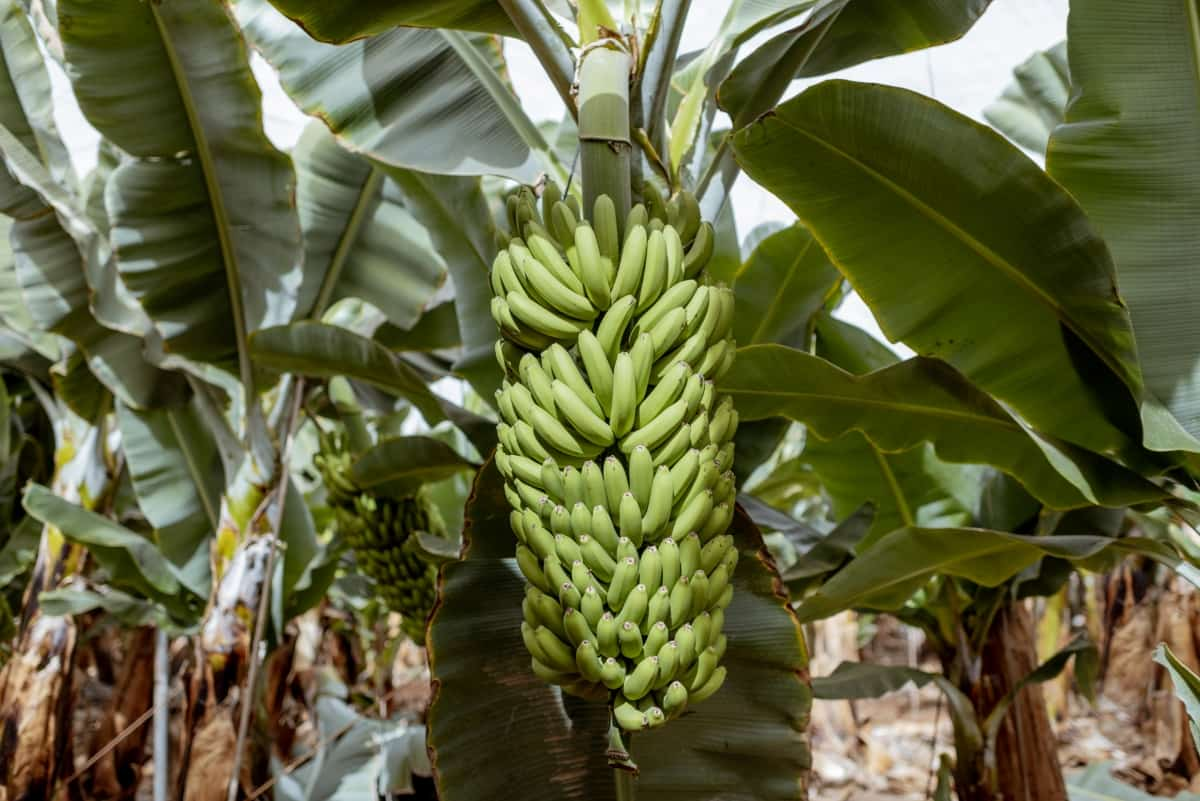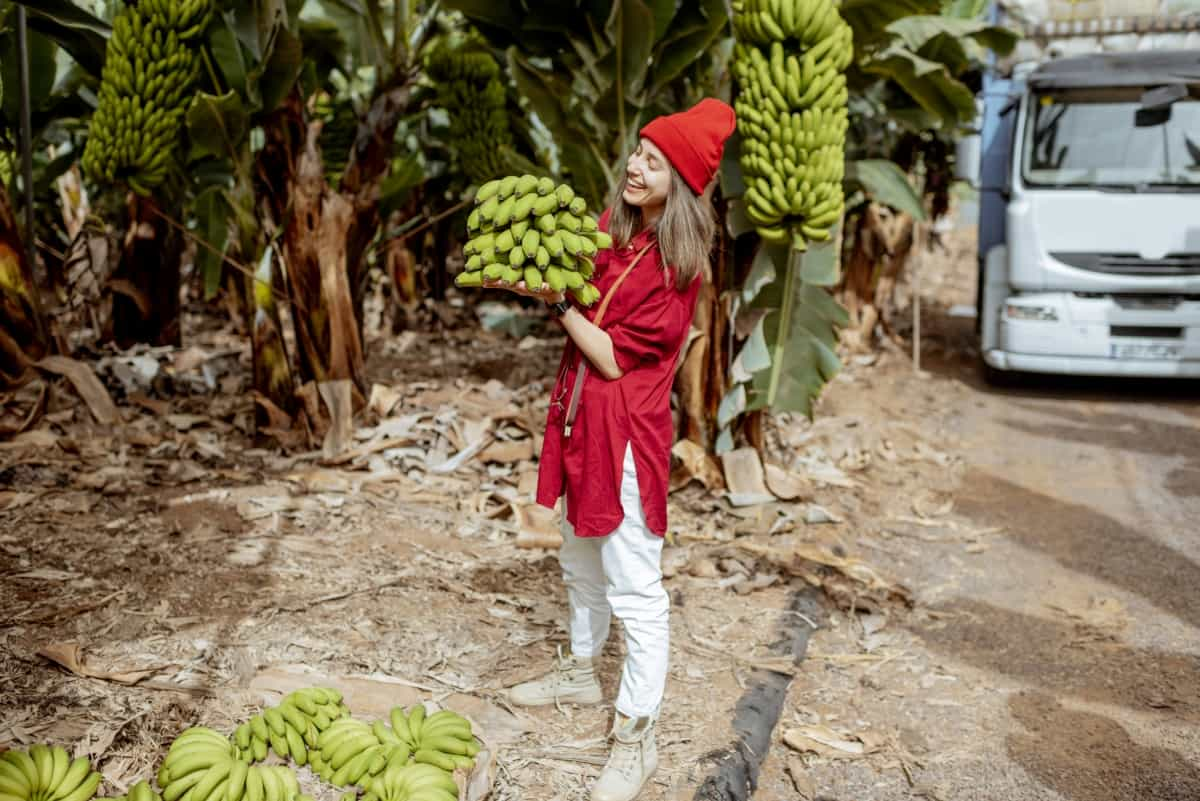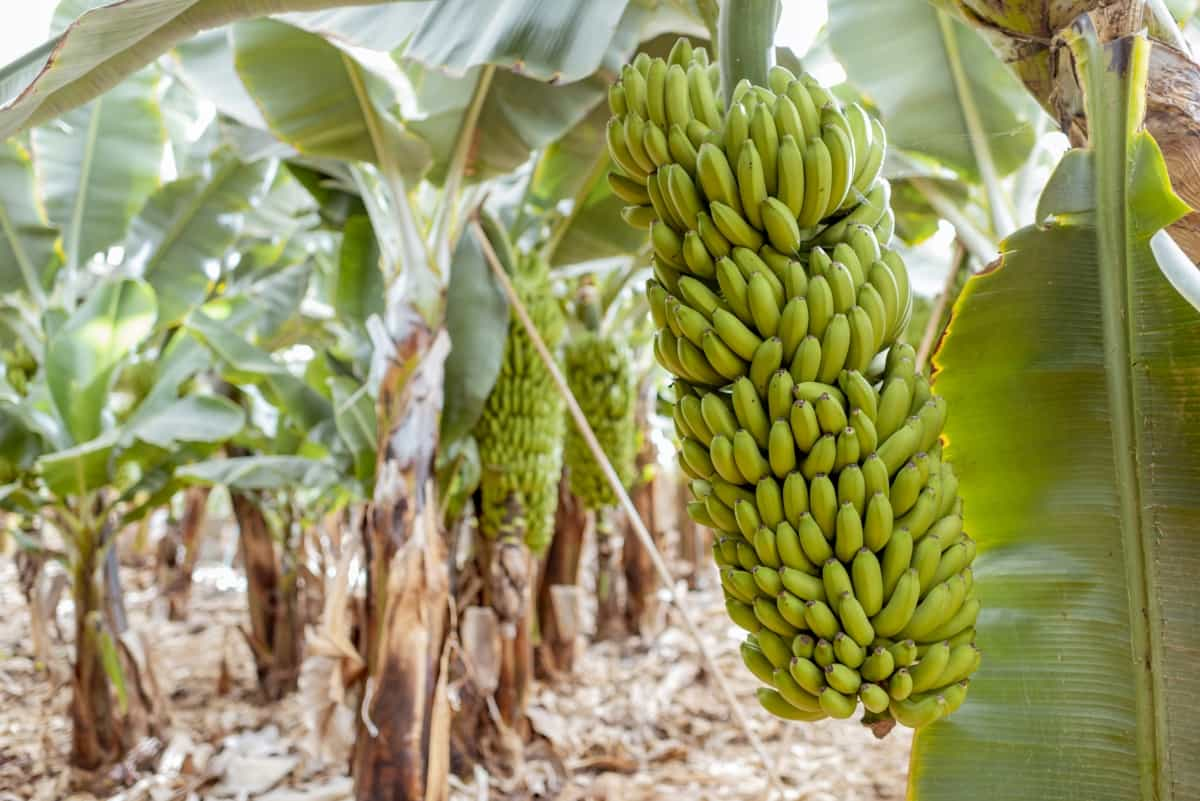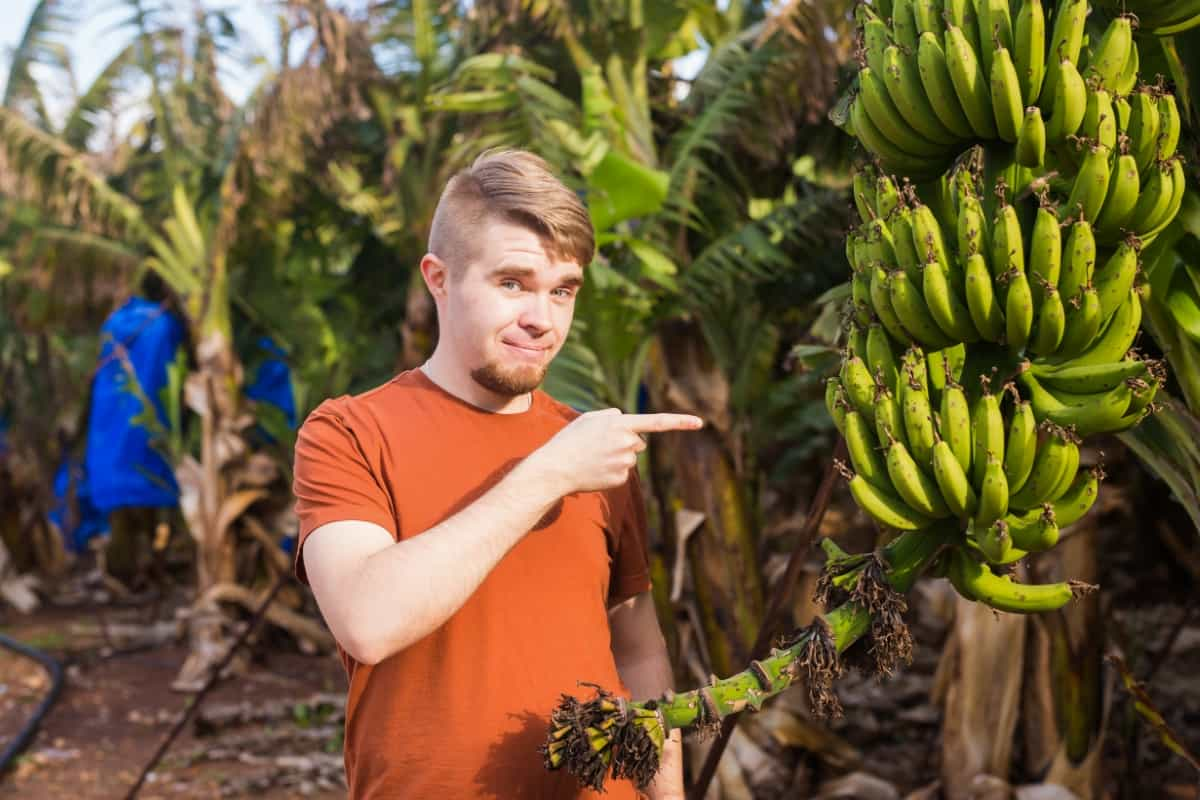Organic banana farming emphasizes sustainable and chemical-free cultivation methods. It involves planting disease-resistant banana varieties, using natural fertilizers like compost and mulch, and employing biological pest control. Farmers avoid synthetic pesticides and genetically modified organisms, focusing on organic certification standards. This eco-friendly approach promotes soil health and biodiversity and produces healthier bananas. It also helps protect the environment and supports sustainable agriculture practices, appealing to consumers seeking pesticide-free, sustainably grown fruit.

Organic Banana Farming
Soil Preparation for Organic Banana Farming
Soil preparation is a crucial step in organic banana farming. Begin by selecting well-drained, loamy soil with a pH of around 6 to 7. Before planting, clear the land of weeds and debris and incorporate organic matter like compost and well-aged manure to improve soil fertility and structure.
Adding organic material enhances water retention and nutrient availability. Perform soil tests to identify nutrient deficiencies and amend accordingly with natural sources like bone meal or rock phosphate. Implement green manure cover crops like legumes to fix nitrogen and suppress weeds. This comprehensive soil preparation sets the foundation for healthy organic banana plants and sustainable yields.
Choosing the Right Banana Variety for Organic Farming
Consider disease-resistant and robust cultivars like ‘Cavendish,’ ‘Gros Michel,’ as they can thrive without heavy pesticide use. Some local or indigenous varieties may resist pests and diseases naturally. Choose varieties that suit your climate and soil conditions, as this can reduce the need for excessive irrigation and soil amendments.
Organic practices often favor heirloom or non-hybrid varieties, which maintain genetic diversity and can adapt to environmental changes. The right choice of banana variety is essential for achieving sustainable and productive organic banana farming.
Organic Pest and Disease Management for Bananas
Organic pest and disease management in banana farming involves biological controls, beneficial insects, and natural remedies. Employ crop rotation and intercropping to disrupt pest life cycles and promote biodiversity. Regularly inspect plants for early signs of diseases and remove infected parts to prevent spreading.
In case you missed it: Different Methods of Banana Propagation: Exploring Various Techniques

Use neem oil, garlic, or soap solutions as natural pesticides. Encourage predator insects like ladybugs and lacewings to control pests. Additionally, maintain good hygiene by cleaning tools and equipment to prevent disease transmission. Organic practices minimize chemical interventions, promoting healthier, environmentally friendly banana cultivation.
Composting for Organic Banana Farming
Collect organic materials like banana leaves, kitchen scraps, and other plant matter. Layer them with brown materials like straw or wood chips to maintain a balanced carbon-to-nitrogen ratio. Turn the compost pile regularly to aerate it and promote decomposition. After several months, the compost will transform into a nutrient-rich, humus-like material.
Incorporate this compost into the soil to improve fertility, water retention, and microbial activity. Composting not only recycles organic waste but also enhances soil health, reducing the need for synthetic fertilizers and promoting sustainable, eco-friendly banana cultivation.
Crop Rotation for Organic Banana Farming
It helps break the cycle of pests and diseases affecting banana plants over time. By alternating banana crops with different plant species, you reduce the risk of soil depletion and the buildup of specific banana-related issues. Legumes like beans or cover crops like sunflowers can help fix nitrogen and improve soil structure during the rotation.
Additionally, intercropping with complementary crops can maximize land use and diversify the ecosystem, contributing to natural pest control. Proper crop rotation is a sustainable approach to maintain soil health and promote long-term organic banana production.
Organic Fertilizers for Bananas
Options include well-rotted compost, aged manure, and organic matter like rice husks. These fertilizers enhance soil structure and nutrient content, promoting microbial activity and beneficial organisms. Green manure crops like legumes can fix nitrogen. Natural sources such as rock phosphate and bone meal can supply essential minerals.
In case you missed it: How to Increase Banana Yield with Pruning and Deleafing Techniques

Banana plants benefit from balanced nutrition, focusing on potassium and phosphorus. Using organic fertilizers reduces the environmental impact and minimizes chemical residues in the produce. Properly applied organic fertilizers support sustainable, eco-friendly banana cultivation while maintaining soil health and fertility.
Irrigation Management for Organic Banana Farming
Employ drip irrigation or soaker hoses to directly deliver water to the root zone, minimizing evaporation and water wastage. Monitor soil moisture levels regularly, adjusting irrigation frequency and duration based on plant needs and weather conditions. Use mulch, such as organic materials or cover crops, to retain soil moisture and regulate temperature.
Implement rainwater harvesting systems to reduce reliance on external water sources. Avoid overwatering to prevent waterlogged soil from leading to root rot and other diseases. Proper irrigation practices promote water conservation and ensure healthy, thriving banana crops in organic farming systems.
Banana Plant Propagation for Organic Farming
Banana plant propagation in organic farming involves several methods, with suckers and tissue culture being common choices. Suckers are shoots that grow at the base of the parent plant. Choose healthy, disease-free suckers and separate them from the parent plant for replanting. Select disease-free plant material for tissue culture and multiply it through in-vitro techniques.
It ensures uniformity and disease-free plants. Planting pits are prepared with organic matter and adequate spacing. Organic practices emphasize avoiding synthetic growth regulators. Proper care and soil enrichment are essential for successful propagation, promoting strong, disease-resistant banana plants in organic farming systems.
Marketing Organic Bananas
Marketing organic bananas involves highlighting their unique benefits. Emphasize the absence of synthetic chemicals, appealing to health-conscious consumers. Certifications from reputable organic organizations instill trust. Utilize eco-friendly packaging and labels to reflect the sustainable production process. Target niche markets, such as health food stores, farmer’s markets, and specialty grocers.
In case you missed it: How to Prepare the Land for Banana Plantation: Soil Requirements and Preparation Steps

Leverage social media and online platforms to showcase organic farming practices and their positive environmental impact. Provide educational content about the advantages of choosing organic bananas. Collaborate with local communities and organizations to raise awareness. Building a transparent, environmentally-conscious brand image is key to successful organic banana marketing.
Conclusion
Organic banana farming embodies sustainable, eco-friendly practices prioritizing soil health, biodiversity, and consumer well-being. Farmers foster a balanced ecosystem by eschewing synthetic chemicals, reducing environmental impact. Disease-resistant varieties and natural pest control methods ensure robust yields. Moreover, organic bananas offer consumers a healthier, pesticide-free alternative. Embracing this approach supports sustainable agriculture and contributes to a more resilient and environmentally conscious food system.
- Feed Your Flock for Less: Top 10 Tips to Save on Chicken Feed
- Ultimate Guide to Ossabaw Island Hog: Breeding, Raising, Diet, and Care
- Hatching Answers: The Top 10 Reasons Your Chickens Aren’t Laying Eggs
- Eggs and Economics: Breaking Down the Cost of Raising Backyard Chickens
- Defend Your Greens: Proven Methods to Keep Iguanas Out of Your Garden
- Ultimate Guide to Cinnamon Queen Chicken: A Comprehensive Guide for Beginners
- Ultimate Guide to California Tan Chicken: Breeding, Raising, Diet, Egg-Production and Care
- Ultimate Guide to Marsh Daisy Chicken: Breeding, Raising, Diet, and Care
- 10 Types of Chicken Farming Businesses You Can Start for Profits